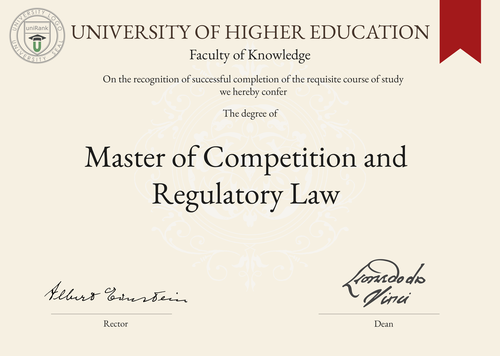
Master of Competition and Regulatory Law (M.C.R.L.)
Guide to Master of Competition and Regulatory Law Program/Course/Degree
Master of Competition and Regulatory Law (M.C.R.L.)

Program Name
Master of Competition and Regulatory LawProgram or Degree abbreviation
M.C.R.L.Duration range
The duration of the program can vary depending on the country or university, typically ranging from 1 to 2 years.Tuition range
The tuition fees for the Master of Competition and Regulatory Law program can vary depending on the country or university, with a range of fees available.Overview
The Master of Competition and Regulatory Law program is designed to provide students with a comprehensive understanding of competition law and regulatory frameworks. This program equips students with the necessary knowledge and skills to navigate the complex legal landscape of competition and regulation in various industries.Curriculum Overview by year
The curriculum of the Master of Competition and Regulatory Law program is structured to cover both theoretical and practical aspects of competition and regulatory law. The coursework typically includes subjects such as competition law, regulatory frameworks, antitrust policies, mergers and acquisitions and legal analysis.Key Components
The key components of the Master of Competition and Regulatory Law program include in-depth study of competition law, understanding regulatory frameworks, analyzing antitrust policies and developing legal skills for effective practice in this field.Career Prospects
Graduates of the Master of Competition and Regulatory Law program have various career opportunities in both public and private sectors. They can work as competition lawyers, regulatory consultants, legal advisors, or policy analysts in government agencies, law firms, multinational corporations, or international organizations.Salary Expectations
The salary expectations for graduates of the Master of Competition and Regulatory Law program can vary depending on factors such as location, experience and the specific industry they choose to work in. Generally, professionals in this field can expect competitive salaries. For a more accurate understanding of salary expectations, you can utilize the Job Sites Search Engine, from our sister site jobRank, which searches over 4,600 job sites worldwide. Make sure to specify not only the job title but also the country you are interested in.Conclusions:
It is important to note that the duration, tuition fees, curriculum, key components, career prospects and salary expectations of the Master of Competition and Regulatory Law program can vary depending on the country or location where you choose to study, as well as the university you select. Visitors interested in pursuing this degree are encouraged to use the uniRank World Universities Search Engine to find institutions offering the Master of Competition and Regulatory Law program worldwide.World Universities Search Engine
search for Master of Competition and Regulatory Law (M.C.R.L.) and add the Location (country, state etc.) or specific University you are interested in studying at.
Query examples:
- Master of Competition and Regulatory Law (M.C.R.L.) United States
- Master of Competition and Regulatory Law (M.C.R.L.) United Kingdom online
- Master of Competition and Regulatory Law (M.C.R.L.) Australia international students
- Master of Competition and Regulatory Law (M.C.R.L.) University of California
- Master of Competition and Regulatory Law (M.C.R.L.) University of London tuition fees
- Master of Competition and Regulatory Law (M.C.R.L.) University of Sydney scholarships
Share Program/Course
Interesting? Share this program/course/degree info with your friends now.